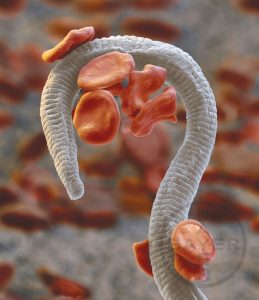Heartworm disease in dogs is a silent killer that is often overlooked until it’s too late. This preventable condition starts with a mosquito bite and ends with either a long, expensive treatment or death.
Symptoms may not appear until the worm reaches maturity (usually around 6 months).
SIGNS OF HEARTWORMS IN A DOG

A soft, dry cough
The parasites make their way to the lungs and start multiplying in the lungs and surrounding veins. Coughing may be most noticeable after exercise and may end with fainting. Even light exercise can cause fainting.
Inactivity or lethargy
Your pet suddenly seems tired more often, doesn’t want to go outside, or avoids all physical activity. Dogs with heartworm infection are weakened and find it difficult to be active even when performing small tasks.
Weight loss or anorexia
Even minor physical activities, such as eating, can become difficult and exhausting chores.
Rapid or difficult breathing
Along with coughing, breathing problems occur when the worms inhabit the lungs and surrounding veins. Fluid can also build around the blood vessels in the lungs, making it difficult for the lungs to oxygenate the blood.
Bulging chest
The ribs may seem to protrude, and the chest has a bulging appearance as a result of adult heartworm infection. This symptom can result from weight loss and anorexia caused by heartworms. This can also be caused by fluid buildup in response to the parasite’s presence.
Allergic reaction
Although allergic reaction is more common in cats, it is possible for dogs to show symptoms similar to an allergic reaction or asthmatic symptoms in response to the heartworms or their offspring.
Collapse
Large numbers of heartworms invade the heart and cause blockage of blood flow (known as caval or vena cava syndrome). Collapse is usually accompanied by shock and red blood cell destruction. Death can follow within days.
Other symptoms are possible, too:
- Nosebleeds
- Secondary pneumonia
- Increased blood pressure
- Excessive sleeping
- Seizures
- Blindness
- Lameness
Some of the symptoms above can also be signs of other conditions, which makes it more difficult to detect heartworm infection. There are other tools used by vets to detect the condition more accurately.
Dr. Sarah Kalivoda
Mountain View Animal Hospital & Holistic Pet Care
Reno, Nevada
775-853-6900












Leave A Comment